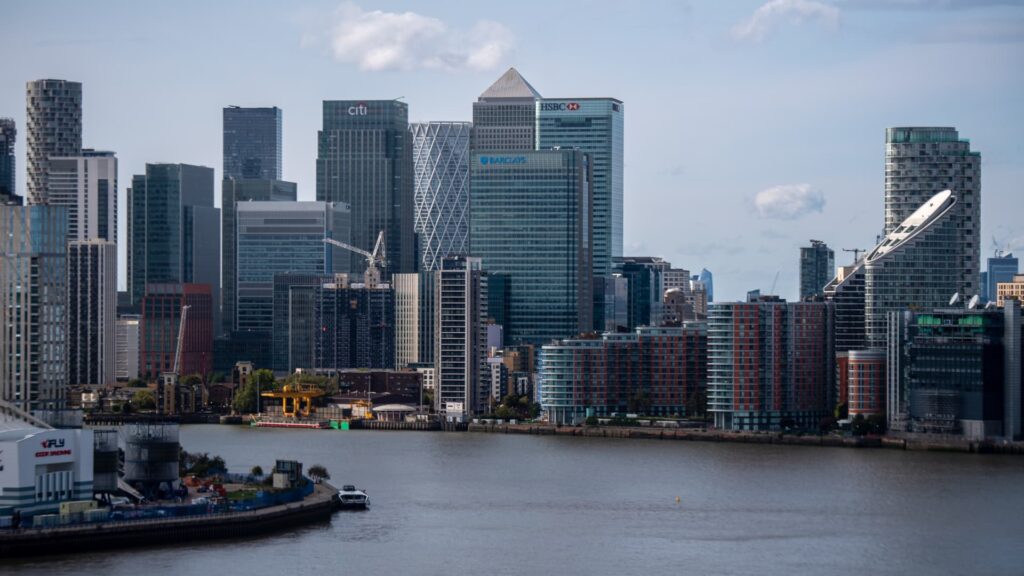European markets traded firmly in the red on Friday morning as concerns over the banking sector reached the region.
The Pan-European Stoxx 600 was 1.5% lower at 10:30 a.m. in London (5:30 a.m. ET), with all major indexes and sectors in negative territory. The U.K.’s FTSE index was 1.3% lower, France’s CAC 40 was down 0.6%, while Germany’s DAX and Italy’s FTSE MIB both fell over 2%.
It comes as spillover from the U.S. banking sector hit European stocks on Friday, with the Stoxx Europe 600 Banks Index sliding around 3%.
In the U.S. on Thursday, shares of regional banks and investment bank Jefferies tumbled as fears mounted around some bad loans lurking on Wall Street.
The bankruptcy of two auto-related firms, Tricolor and First Brands, were among the first to spark fears in the private credit market. Jefferies and UBS were both exposed to First Brands’ demise, with $715 million and $500 million at risk, respectively, as the firm’s demise exposed a maze of complex debt agreements held with a range of lenders and investment funds globally.
Hot on their heels, Zions Bancorporation on Wednesday evening disclosed a loss of $50 million on two commercial loans, and Western Alliance on Thursday alleged that a borrower had committed fraud.

Former European Central Bank President Jean-Claude Trichet told CNBC’s “Squawk Box Europe” on Friday that “cautious and vigilance is of the essence anywhere in the world” when it comes to credit quality concerns.
“That being said, I will not dramatize the situation in the U.S. at the very moment, I don’t think that there is a likelihood of an enormous difficulty in the U.S., but it remains that a lot of decisions that were taken by the present administration have not yet been digested, swallowed, by the market, both on inflation and on the slowing down of growth,” he added, pointing to “stagflation” due to tariffs, deficit and the U.S.’ immigration policy.

Stoxx Europe 600 Banks Index
Elsewhere in the banking sector, Spanish bank BBVA‘s attempted hostile takeover of Sabadell failed on Thursday, when it failed to convince shareholders to back the 16.32 million euro ($19.1 million) bid.
BBVA shares rose 5.8% on Friday as investors reacted to the news, while Sabadell’s fell almost 8%.
Defense stocks are also in the spotlight after it was announced that U.S. President Donald Trump and Russian President Vladimir Putin will be meeting in Hungary to discuss the ongoing war in Ukraine.
The Stoxx Europe Total Market Aerospace and Defense index was over 3.4% lower on Friday. On individual stocks, Rheinmetall and Hensoldt tumbled 6.8%, and Renk fell by 5.7%
It marks a stark change for the banking and defense sectors, which have been bright spots in the European equities rally this year. Their respective indexes have gained around 54% and 60% over the course of 2025.

Meanwhile, the possibility of an AI bubble also continues to dominate conversation. UBS exec Michel Lerner told “Squawk Box Europe” on Friday that investors ask him, “is the last hurrah, a la 2000?”
“As long as the narrative in there, it’s all fine, right? The thing that worries us is the extent in which the market has moved is very akin to what you saw in the run up to dotcom,” he said, referencing perhaps what is the most well-known tech boom and bust. This may be the peak of the cycle, Lerner added, but it’s not clear how long momentum will last.
As such, investors should hedge their bets with stocks that have momentum but haven’t ran away from business fundamentals, he said, such as those in consumer staples, healthcare and luxury.
Volvo Group down 8%
On the corporate front, Swedish truckmaker Volvo Group on Friday posted marginally higher-than-expected third-quarter earnings.
The Gothenburg-based company, which manufactures trucks, buses and construction equipment, said third-quarter net profit came in at 11.7 billion Swedish kronor ($1.3 billion), noting “difficult market conditions in North America and South America impacted sales negatively.” Analysts polled by LSEG had expected net profit of 8.75 billion Swedish kronor.
Shares of Volvo Group are down around 1% year-to-date. They fell 8% on Friday morning in what is shaping up to be the firm’s worst day since April.
Elsewhere, European inflation data was confirmed at 2.2% on Friday, per Eurostat, the European Union’s data office. It was in line with expectations.
Inflation has been a key focal point among delegates at the IMF and World Bank annual meetings this week. The “easing cycle is close to an end or at its end,” European Central Bank Governing Council member Martin Kocher told CNBC in an exclusive interview.
The U.K.’s data bureau, the Office for National Statistics, released its monthly growth figures on Thursday, showing the economy expanded by a meager 0.1% in August.
Meanwhile, the Swiss government reduced its 2026 growth forecast to 0.9% as Trump’s tariffs hit Switzerland’s export-heavy economy.
In Asian markets, most indexes traded lower on Friday, with the exception of South Korea’s Kospi which hit record highs. It comes as the country continues trade deal talks with the U.S.
U.S. stock futures edged lower on Thursday night amid a sell-off of banking stocks in the previous session.
— CNBC’s Sam Meredith and Silvia Amaro contributed to this report.


